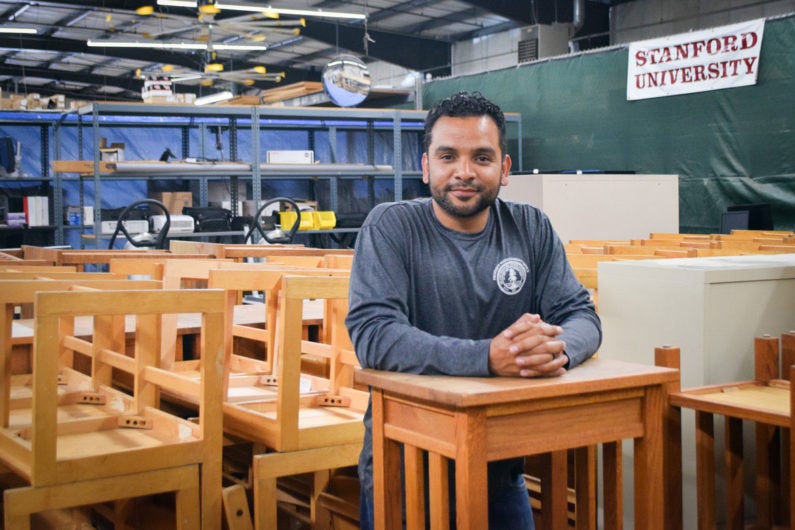At Stanford's surplus property warehouse, one person’s trash is another’s treasure
From a warehouse at 340 Bonair Siding, the Surplus Property Sales staff sells everything from computers to furniture to vehicles – all at significantly reduced prices.
Alex Perez oversees what may be one of the best garage sales anywhere.

Alex Perez, surplus sales manager in Stanford’s Property Management Office, makes sure unneeded items find new homes. (Image credit: Kate Chesley)
From a 3,000-square-foot warehouse at 340 Bonair Siding, Perez and his four-person staff offer Stanford’s surplus property for sale at delightfully reasonable prices.
A sturdy red-oak, mission-style end table? Just $10. Its matching four-drawer dresser? Only another $40. Need binders for an upcoming conference? They are just 10 cents each.
The surplus storehouse is open to everyone, including the public, on Wednesday and Thursday, 9 a.m. to 4 p.m. Members of the university community get a 10 percent discount for items they buy for personal use. For university departments, reuse of furniture is free.
But, if you visit Surplus Property Sales and see something you like, you’d better grab it quickly. Furniture and other items that tend to draw a lot of interest move fast. A local church, a California winery and several schools, for instance, quickly emptied the warehouse of chairs, desks, bureaus and side tables made available by renovations in the Rains residence houses.
Only authorized seller
The Surplus Property Sales office, which is a self-sustaining auxiliary service, is the only entity authorized to sell university equipment and materials.
But there is a considerable advantage to departments to deal with the office when disposing no-longer-needed items. For one thing, department property managers can process disposals online. In addition, departments can avoid disposal fees associated with landfill, can contribute to the university’s sustainability goals and can reap part of the profits from the sale. Departments can earn anywhere from 25 to 90 percent from the sale of individual items selling for more than $1,000. In the past five years, more than $2.5 million has been disbursed back to campus departments.
“Given the varied and valuable benefits provided to the university, I’m surprised when people say they didn’t know Surplus Property Sales existed,” said Stan Dunn, associate director of property management.
You name it, the Surplus Property Sales staff has likely sold it: physicians’ exam tables, electric typewriters, a bloodmobile, vintage cameras and a foosball table are among some of the more interesting items. Some novelty items, however, are not for sale. There is no way the staff is parting with the marble bust of a young woman dating to the 1950s or a big sign advertising the Stanford Gaming Society.
“It’s just like a yard sale,” said Polly Kavanaugh, the disposal specialist who coordinates the surplus collections across campus. “One person’s trash is another’s treasure. There is a buyer for almost anything. You’d be surprised.”
Frequent buyers of surplus property – besides university departments and employees – include start-up companies looking to furnish scant offices, area schools and nonprofit groups that are perfectly satisfied with gently used furniture. What doesn’t sell on site might find a buyer online.
A recent delivery of athletic department dumbbells weighing between 85 and 135 pounds each has stymied Perez and his staff – for now. A public school athletic department might have been a good bet to buy them, but the dumbbells weigh too much for high school athletes. Perez, a nine-year university employee who learned the surplus business while serving in the Navy, is confident a buyer will be found.
“Anything can sell,” he said.
Computers, whole or in parts
Computers are the biggest sellers. After their hard drives are wiped clean, some can be sold as is. Others are useful only as spare parts. What’s left over is sent to Stockton for recycling. The office follows the highest standards for recycling, ensuring that all electronics in particular are processed within California.
Visitors to Bonair Siding leave with the impression that the staff is having fun running the equivalent of a great big yard sale.
“You end up having these wonderful conversations with people,” Kavanaugh said. “There was one gentleman who was a photography buff looking for black and white processing equipment. He talked to us about his travels and all the people he had met.”
Perez said the staff also enjoys locating hard-to-find items for faculty and students involved in research.
“There was one professor who needed just the ball from a specific computer mouse for a robot,” he said. “We found him one.”
